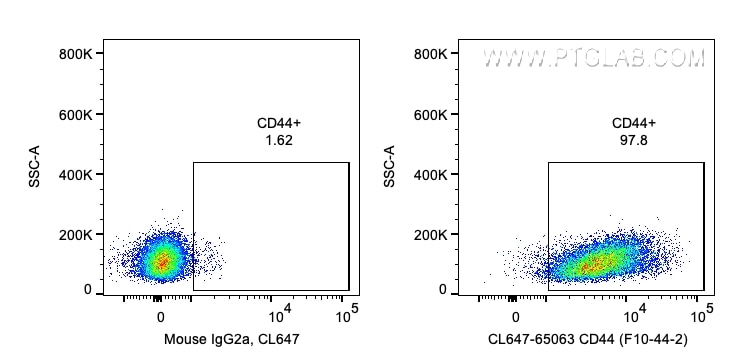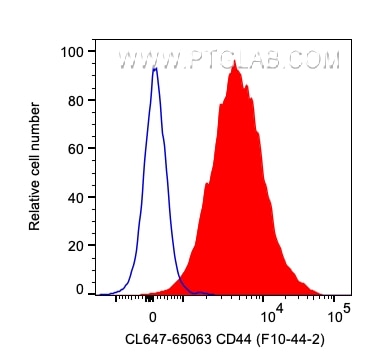Anticorps Monoclonal anti-CD44
CD44 Monoclonal Antibody for FC
Hôte / Isotype
Mouse / IgG2a, kappa
Réactivité testée
Humain
Applications
FC
Conjugaison
CoraLite® Plus 647 Fluorescent Dye
CloneNo.
F10-44-2
N° de cat : CL647-65063
Synonymes
Galerie de données de validation
Applications testées
| Résultats positifs en cytométrie | CMSP humaines, |
Dilution recommandée
| Application | Dilution |
|---|---|
| This reagent has been pre-titrated and tested for flow cytometric analysis. The suggested use of this reagent is 5 μl per 10^6 cells in a 100 µl suspension or 5 μl per 100 µl of whole blood. | |
| Sample-dependent, check data in validation data gallery | |
Informations sur le produit
CL647-65063 cible CD44 dans les applications de FC et montre une réactivité avec des échantillons Humain
| Réactivité | Humain |
| Hôte / Isotype | Mouse / IgG2a, kappa |
| Clonalité | Monoclonal |
| Type | Anticorps |
| Immunogène | Lymphocytes T purifiées de ganglions lymphatiques humains |
| Nom complet | CD44 molecule (Indian blood group) |
| Masse moléculaire calculée | 742 aa, 82 kDa |
| Numéro d’acquisition GenBank | BC004372 |
| Symbole du gène | CD44 |
| Identification du gène (NCBI) | 960 |
| Conjugaison | CoraLite® Plus 647 Fluorescent Dye |
| Excitation/Emission maxima wavelengths | 654 nm / 674 nm |
| Forme | Liquide |
| Méthode de purification | Purification par affinité |
| Tampon de stockage | PBS with 0.09% sodium azide and 0.5% BSA. |
| Conditions de stockage | Store at 2-8°C. Avoid exposure to light. Stable for one year after shipment. |
Informations générales
CD44 is a type I transmembrane glycoprotein expressed on embryonic stem cells and in various levels on other cell types including connective tissues and bone marrow. CD44 expression is also upregulated in subpopulations of cancer cells and is recognized as a molecular marker for cancer stem cells (PMID: 29747682). It is a cell-surface receptor that mediates cell-cell and cell-matrix interactions through its affinity for hyaluronic acid (HA) and possibly also through its affinity for other ligands (PMID: 10694938). Adhesion with HA plays an important role in cell migration, tumor growth and progression. CD44 is also involved in lymphocyte activation, recirculation and homing, and in hematopoiesis.



